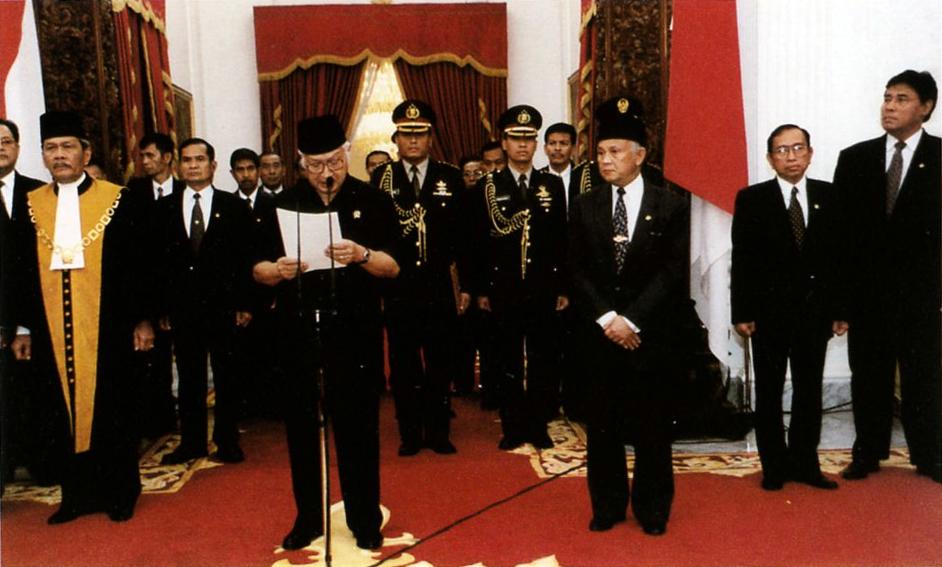The end of Suharto
Posted By Natalie Sambhi on May 24, 2013 @ 06:00
 [1]
[1]This week marks 15 years since Indonesian cities erupted in violence in early May 1998. Burdened with economic hardship from the East Asian Financial Crisis and fatigued with political corruption, Indonesians took to the street and, amid clashes with armed forces, demanded an end to Suharto’s 31-year rule. On 21 May, Suharto resigned as president [2] (video) and the New Order was over.
Over the past 15 years, Indonesia has developed in various ways since Suharto left centre stage.
For one, after Suharto’s departure, under a series of reforms during the period known as reformasi, democracy took the place of autocracy. According to Freedom House [3], Indonesia is currently rated ‘free’ and an ‘electoral democracy’. The country has made substantial gains both in its own right and when compared to [4] other democracies in East Asia like Thailand and the Philippines. As Ed Aspinall sees it [5], Indonesia is judged as being the most democratic system in Southeast Asia.
But there is a note of caution to add: conservatives have wound back reforms in electoral management, counter-corruption and minority rights [6], and there’s no guarantee that civil society can hold back further attacks on reform. That said, taking a long-view, it’s a far more open political system than its predecessor in which few credible political alternatives existed. As we look to 2014’s presidential election, democracy might very well deliver some surprises for us: will Prabowo [7] or the wild card Jokowi make it to the Presidential Palace? [8]
Since the New Order, Indonesia has developed active media that’s currently rated by Freedom House [9] as ‘partly free’. Indonesia’s ‘citizen journalists’ can express their satisfaction (or dissatisfaction) directly and openly to the President—even via his Twitter account [10]. But several of the main news networks are controlled by a handful of players with vested interests, so it remains to be seen [11] whether we can expect independent coverage of the upcoming election.
The military has made substantial strides towards reform, withdrawing from politics and revenue-raising practices. But worries remain. The recent case of Kopassus revenge killings in a Yogyakarta prison raises questions about a culture of impunity and human rights abuses, although relatively swift action by military leaders to reassign those responsible for their soldiers’ actions is a positive sign that TNI is aware of the damage these cases wreak on their perception of a professional military. The establishment of a hotline for public complaints [12] and more talk of military discipline law [13] in the past month alone are steps, even if baby ones, in the right direction. The police needs to follow [14] this move towards greater accountability. Indonesia is still a country with work to do on the rule of law, especially combating corruption and broader reforms to promote a more stable environment for investment.
Lacking large reserves of capital, investment is vital for Indonesia’s continued economic growth. Under the New Order, economic growth steamed ahead at unprecedented rates, at times over 7%. This was the result of a policy of integration with the global market. In some ways it turned out to be a house of cards which came tumbling down in 1997 as Indonesia buckled to the East Asian financial crisis. Since then, the economy has rebuilt and has achieved, on average, a respectable 6% growth over the past few years and is expected to stay around that level.
However, there are concerns [15] that Indonesia’s economy could be let down by a lack of infrastructure, high levels of corruption and slow increases in average incomes. Other economists warn [16] that growth driven by services and commodities might not be enough to sustain high growth rates and that the manufacturing sector requires greater investment. Other ongoing issues include income inequality and increasing fuel subsidies, which also diverts money away from infrastructure investment.
And it remains to be seen how Indonesia’s accumulated riches from its economy will benefit the majority of the 240 million inhabitants of the archipelago. The test case of Jakarta’s newly implemented health care system shows signs of trouble [17] (video) and raises doubts about the viability of programs in towns with fewer hospitals and doctors.
There are other aspects of Indonesia that are at risk of flaring up and undermining its stability. Inter-religious and inter-ethnic violence in areas like Poso [18] in Sulawesi and the threat of terrorism against local targets [19] will require greater attention by security forces.
It’s been a big decade and a half. And at the macro level it’s an almost entirely a good-news story. But, especially for Australia, it’s important to understand that Indonesia’s circumstances at the ground level are more nuanced. Whether Indonesia can be expected to meet our enthusiasm about Asian Century initiatives might depend on its capacity on fixing pressing domestic issues first. Much has changed since Suharto, but some things have stayed the same.
Natalie Sambhi is an analyst at ASPI and editor of The Strategist. Image courtesy of Wikimedia Commons [20].
Article printed from The Strategist: https://aspistrategist.ru
URL to article: /the-end-of-suharto/
URLs in this post:
[1] Image: https://aspistrategist.ru/wp-content/uploads/2013/05/Suharto_resigns.jpg
[2] Suharto resigned as president: http://www.abc.net.au/4corners/stories/2011/08/08/3288527.htm?site=50y
[3] According to Freedom House: http://www.freedomhouse.org/country/indonesia
[4] when compared to: http://www.eastasiaforum.org/2009/10/26/how-is-indonesias-democracy-doing/
[5] sees it: http://www.abc.net.au/radionational/programs/saturdayextra/indonesia-series/4532734
[6] conservatives have wound back reforms in electoral management, counter-corruption and minority rights: http://www.tandfonline.com/doi/abs/10.1080/13510347.2011.572620?journalCode=fdem20#.UZsD9KKnrgU
[7] Prabowo: http://www.lowyinterpreter.org/post/2013/02/21/Indonesias-next-president-A-form-guide.aspx
[8] Jokowi make it to the Presidential Palace?: https://aspistrategist.ru/the-audacity-of-jokowi/
[9] rated by Freedom House: http://www.freedomhouse.org/report/freedom-press/2012/indonesia
[10] Twitter account: https://twitter.com/SBYudhoyono
[11] remains to be seen: http://www.insideindonesia.org/current-edition/the-era-of-convergent-media
[12] hotline for public complaints: http://www.thejakartaglobe.com/news/indonesian-military-launches-hotline-for-public-complaints/
[13] military discipline law: http://www.thejakartaglobe.com/news/purnomo-calls-for-bill-on-military-conduct/
[14] police needs to follow: http://www.amnesty.org/en/library/info/ASA21/013/2009
[15] concerns: http://www.eastasiaforum.org/2012/12/26/indonesias-economic-development-in-2012/
[16] Other economists warn: http://www.eastasiaforum.org/2012/08/07/indonesian-manufacturing-and-the-middle-income-trap/
[17] shows signs of trouble: http://media.theage.com.au/national/selections/indonesia-healthcare-buckling-under-strain-4289021.html
[18] in areas like Poso: http://en.wikipedia.org/wiki/2005_Indonesian_beheadings_of_Christian_girls
[19] threat of terrorism against local targets: http://www.nytimes.com/2013/05/15/world/asia/indonesian-police-kill-suspect-in-attempted-bomb-attack.html
[20] Wikimedia Commons: http://en.wikipedia.org/wiki/File:Suharto_resigns.jpg
Click here to print.